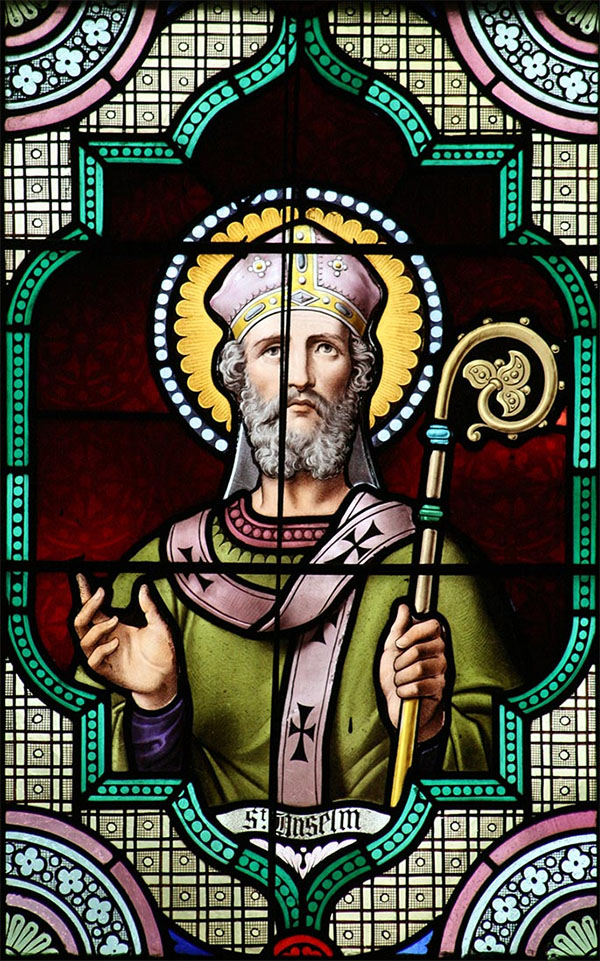 Anselm’s ontological argument, which appears in his Proslogion, is frequently misunderstood. For reference, the argument basically breaks down like this:
Anselm’s ontological argument, which appears in his Proslogion, is frequently misunderstood. For reference, the argument basically breaks down like this:
- God is a being than which none greater can be imagined.
- A being that exists as an idea in the mind and in reality is, all other things being equal, greater than a being that exists only as an idea in the mind.
- Therefore, if God exists only in the mind, we can imagine something that is greater than God (i.e., a God who exists in reality).
- And, therefore, God physically exists in reality, not just as a concept in the mind.
This thing gets trotted out on a fairly frequent basis by Christians who smugly think they’ve made atheists look foolish by proving that God exists. And you’ll just as frequently see atheists respond to this by claiming that Anselm’s argument makes no sense because he’s presupposing the existence of God. He’s just begging the question!
In reality, everybody involved in that discussion is radically misinterpreting Anselm’s intent.
Anselm’s argument presupposes the existence of God because he was dealing with a very specific ontological question of whether or not God was possessed of a physical reality or if he existed only in the human mind.
He argues that God must exist physically and not just in the mind, because God must be greater than any alternative we can imagine (by definition). And if he existed just in our minds then we could imagine him doing that AND physically existing, and therefore he can’t exist only in our minds.
But the entire argument is based on the supposition that God (as defined as “thing which is greater than anything else we can imagine”) actually exists. As such, it can’t tell us anything about the actual existence or non-existence of God. Only that, if God is a thing which is greater than anything else we can imagine, then we can be absolutely certain he doesn’t just exist in our minds.
Similarly, one could say, “Let us accept that a Star Destroyer is the coolest ship that we could possibly imagine. Do Star Destroyers physically exist or are they only imaginary creations of our brains? Well, a Star Destroyer that actually existed would be much cooler than one which is only imaginary. And since we can imagine a Star Destroyer that actually exists, it therefore follows that Star Destroyers do physically exist, by definition, since Star Destroyers are the coolest ship that you can possibly imagine.”
If you already accept that God / Star Destroyers actually exist and you’re simply trying to put some boundaries on what that existence means, this argument is useful. But the minute you try to use this argument to “prove” that God and/or Star Destroyers actually exist, you’re left with a meaningless tautology.

Anselm’s Star Destroyer













“In reality, everybody involved in that discussion is radically misinterpreting Anselm’s intent.”
That’s a pretty extreme claim. What is your evidence for this?
Read the next paragraph?
But you don’t present any evidence in the next paragraph.
You just make a more specific claim about what you think his intent is-
“he was dealing with a very specific ontological question of whether or not God was possessed of a physical reality or if he existed only in the human mind.”
This is a very radical reinterpretation of his intent, such an extreme claim needs some support.
I don’t think that anyone actually educated in philosophy is getting it wrong, and I don’t think many people who are not educated in philosophy or theology have even heard the name Anselm or have any idea what an Ontological Argument even is.
But that said, your criticism of this argument is correct. It’s an argument that defines a property God would have IF he existed, not one that proves his existence. This is why some describe the argument as begging the question or being circular. The very property that this argument assigns to God if He existed is that He would exist. The argument basically has hidden propositions and should be rewritten as:
1) If God exists then he would be the greatest possible being.
2) It is greater to actually exist than to merely be a concept.
_____________________
3) Therefore if God exists, then he actually exists and is not merely a concept.
Another way to rewrite this argument to avoid falling into that trap is to add proposition 2b)
2b) It is not possible for a concept of God to exist without an actual God to inspire that concept.
Other theologians and philosophers like St Augustine and Descartes added that proposition but it doesn’t rescue the argument because there’s no reason to believe that 2b is true.
Justin provided an excellent counterexample–similar to critiques made by multiple men of religion since, such as Thomas Aquinas.
However, we apparently can turn to Anselm himself to “prove” his intent, as his response to a critic that made an argument just like Justin’s (Gaunilo de Marmoutier) indicates that it is based on a presupposition that God must or is likely to exist, (unlike the Star Destroyer, he would claim). Which is more or less how Justin characterizes it here.
I’m no scholar–this all can be gleaned from the Wikipedia page on the subject: https://en.wikipedia.org/wiki/Anselm_of_Canterbury#Responsio
The standard interpretation is that Anselm is making an argument for the existence of God. Justin is claiming this is a misinterpretation and that he is assuming that God exists, and is trying to determine the nature of God. That claim clearly requires some support. Looking at the text itself, I see a lot of evidence for the former.
Going off the translation here (https://legacy.fordham.edu/halsall/basis/anselm-proslogium.asp)
Anselm sets out at the beginning that he’s going to try to prove the existence of God
“In this brief work the author aims at proving in a single argument the existence of God”
“I began to ask myself whether there might be found a single argument which would require no other for its proof than itself alone; and alone would suffice to demonstrate that God truly exists”
The section dealing with the ontological argument makes his intent even clearer
“Truly there is a God, although the fool has said in his heart, There is no God.”
Maybe this is a bad translation? If it is faithfully reproducing his meaning it’s hard to see how you could not interpret this as an argument for the existence of God.
Sebastien, thanks for the wiki link. The passage you cited refers back to (http://www.iep.utm.edu/anselm/) where we can see a more detailed account of Anselms reply to Gaunilo. Here we can see his issue with Gaunilo’s reply was that he had substituted ““greater than everything” for “that than which nothing greater can be thought”, the latter of which only applies to God and not the island. So the difference is not that he’s presupposing God exists but not the greatest island, it is that it is possible to conceive of something greater than the greatest island, but not possible to do so of God.
Furthermore both the wikipedia article you cite and the articles it cites all refer to Anselm’s argument as an argument for the existence of God.
The discussion that Justin is claiming to be full of people that misinterpret Anselm’s intent is not the general, world-wide discussion of Anselm’s argument, e.g. by students of philosophy; rather, it’s the ‘discussion’ he references in the prior paragraph: Christians using it to bludgeon atheists, and atheists arguing that it begs the question.
That said, it’s kind of cool to see a philosophy discussion brew up on a primarily RPG-focused blog — takes me back to my college days. (For various reasons I ended up taking almost entirely philosophy classes in my senior year.)
Leland, the interpretation Justin gives of Anselm’s argument doesn’t agree with the “general” interpretation, whether or not that is who he was saying he disagreed with. Look at my quotations for Anselm, or better yet read the original for yourself- I think you’ll find that the argument Anselm makes differs significantly from the argument Justin claims he is making. Anselm states fairly clearly that he’s arguing for the existence of God. So to claim “the entire argument is based on the supposition that God (…) actually exists” and that “it can’t tell us anything about the actual existence or non-existence of God” is a pretty major mischaracterization! I don’t think Justin would deliberately misrepresent Anselm, so I’m curious what source he’s working from. I have a hard time seeing how he could have read the translation I linked above but summarized the argument as he did above.
Another great Anselm quote from the IEP link above
“I say confidently that if someone should find for me something existing either in reality or solely in thought, besides ‘that than which a greater cannot be thought,’ to which the schematic framework [conexionem] of my argument could rightly be adapted [aptare valeat], I will find and give him this lost island, nevermore to be lost.”
So not only does Anselm not think that his arguments could be generalized to the perfect island (or Anselm’s Star Destroyer!) the way Justin does above, but he even says that if it could be generalized that it would mean that the island (or Star Destroyer) does exist! And once more we see that he is unambiguously arguing about the existence of God, despite Justin’s claims to the contrary.
I agree with Collin’s analysis. And in any case, even if Anselm was aware that he was presupposing God, the people who bring up Anselm now are using it as an argument for existence; and therefore atheists are correct to point out that they are presupposing what they set out to prove.
It’s a bit unfair to accuse atheists of misunderstanding a historical argument, when they are only responding to the argument they are presented with.
Do we get to do cosmological , teleological, and epistemological next? 😀